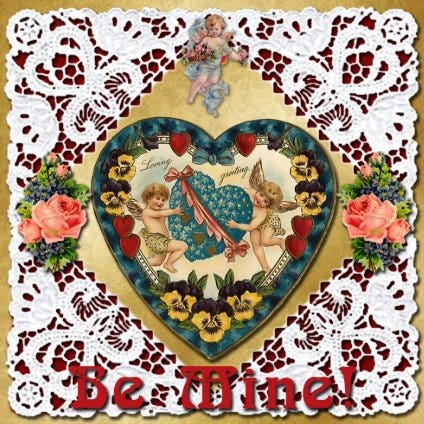Two Hearts Carved On a Tree
A fever dream of love and death
Below is a passage from Pale Horse, Pale Rider, a very long story by Katherine Anne Porter. You may’ve become aware of this story a few years ago; it got a lot of attention during the pandemic; it is set during the 1918 influenza epidemic and is an affecting account of life on the ground during that time. Miranda, a newspaper columnist, is out on a date with a guy named Adam, a soldier who is about to deploy for combat overseas. It will be one of their last times together so she doesn’t cancel even though she doesn’t feel well. The next day—at least I think its the next day, time becomes suddenly quite blurred—she is seriously ill and Adam comes to her room to take care of her. What follows is a fantastical account of Miranda’s prolonged near-death experience, during which she falls into a deep crack between life and death, where time, place and selfhood come apart and recombine in shapes simultaneously archetypal and private. In this cacophonic, hallucinatory state she wakes in a forest where love is the blended with violence and penetration means death—though not for her. The violence is not between the lovers, they are nothing but tender. The dream-violence perhaps comes from Miranda’s fear of what may happen to Adam when he departs. But as I read it, it’s also about the violent potential in the intense joining of two mammals, the force that comes out of the ground like a tree with hearts carved into it, which polite society turns into a piece of paper with a sweet message on it.
“Adam,” she said out of the heavy soft darkness that drew her down, down, “I love you, and I was hoping you would say that to me, too.”
He lay down beside her with his arm under her shoulder, and pressed his smooth face against hers, his mouth moved towards her mouth and stopped. “Can you hear what I’m saying?…What do you think I’ve been trying to tell you all this time?”
She turned towards him, the cloud cleared and she saw his face for an instant. He pulled the covers about her and held her, and said, “Go to sleep, darling, darling, if you will go to sleep now for one hour I will wake you up and bring you hot coffee and tomorrow we will find someone to help. I love you, go to sleep—”
Almost with no warning at all, she floated into the clear darkness, holding his hand, in sleep that was not sleep but clear evening light in a small green wood, an angry and dangerous wood full of inhuman concealed voices singing sharply like the whine of arrows and she saw Adam transfixed by a flight of these singing arrows that struck him in the heart and passed shrilly cutting their path through the leaves. Adam fell straight back before her eyes, and rose again unwounded and alive; another flight of arrows loosed from the invisible bow struck him again and he fell, and yet he was there before her untouched in a perpetual death and resurrection. She threw herself before him, angrily and selfishly she interposed between him and the track of the arrow, crying, No, no like a child cheated in a game, It’s my turn now, why must you always be the one to die? and the arrows struck her cleanly through the heart and through his body and he lay dead, and she still lived, and the wood whistled and sang and shouted, every branch and leaf and blade of grass had its own terrible accusing voice. She ran then, and Adam caught her in the middle of the room, running, and said, “Darling, I must have been asleep too. What happened, you screamed terribly?”
After he had helped her to settle again, she sat with her knees drawn up under her chin, resting her head on her folded arms and began carefully searching for her words because it was important to explain clearly. “It was a very odd sort of dream, I don’t know why it could have frightened me. There was something about an old-fashioned valentine. There were two hearts carved on a tree, pierced by the same arrow—you know, Adam—”
“Yes, I know honey,” he said in the gentlest sort of way, and sat kissing her on the cheek and forehead with a kind of accustomedness, as if he had been kissing her for years, “one of those lace paper things.”
“Yes, and yet they were alive, and were us, you understand—this doesn’t seem to be quite the way it was, but it was something like that. It was in a wood—”
“Yes,” said Adam. He got up and put on his tunic and gathered up the thermos bottle. “I’m going back to that little stand and get us some ice cream and hot coffee,” he told her, “and I’ll be back in five minutes,” he said, holding her chin in the palm of his hand and trying to catch her eye, “and you be very quiet.”
Two more valentines to come…





What symmetric delight to be able to “heart” this post
I reread Anne Carson's EROS BITTERSWEET & am reminded at how "ancients" perceived eros as being kind of an traumatic sets of events. A kind of wounding, a soul wounding. This speaks to me. I think initially when I was invited to the, into the life of another, "romantically" which is a term I still struggle with, I had no concept of what to expect prior. I am on the other side now of that little boy and my understanding is wrought with a kind of gnarliness, a ghastliness, even. I don't know that I'd warm (warn) him though, either. I think I respect the way things choose to unfold before me. I let the self trust the rate at which information finds him and him it. You & Anne, I feel, have helped me respect the complex nature of love happenings. Instead of trying to understand it, respect it.